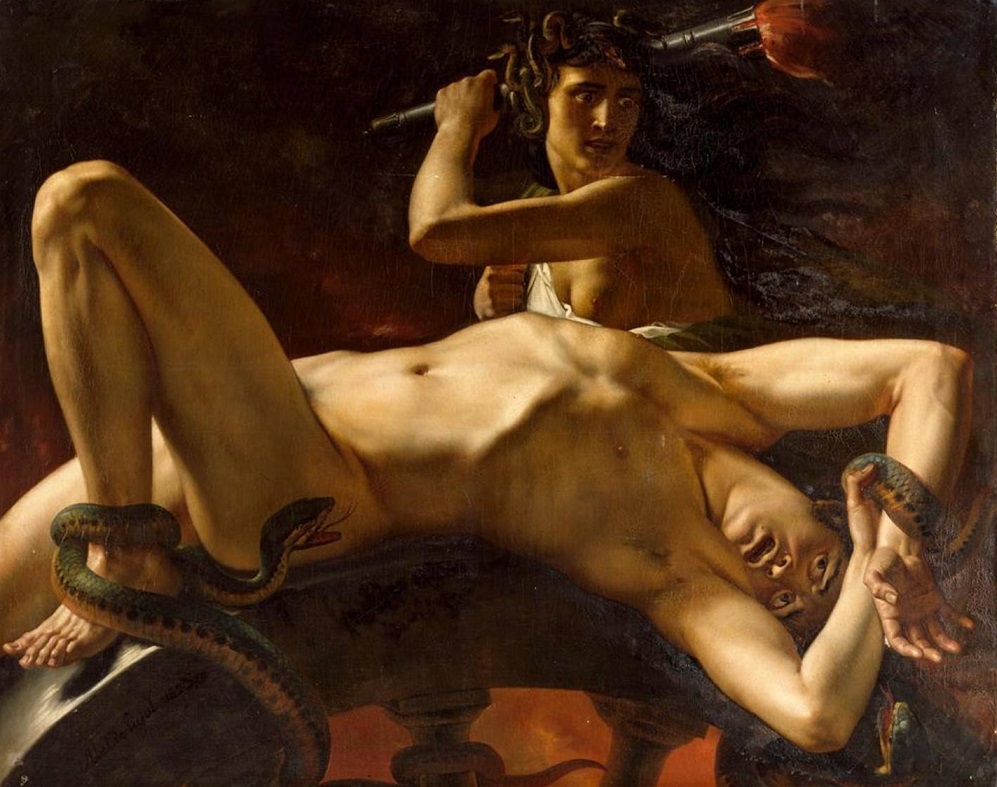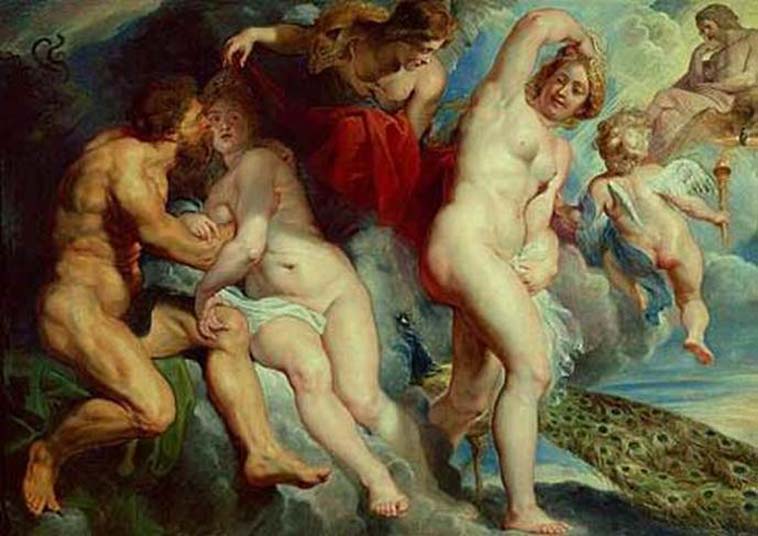Ixion
In Greek mythology, Ixion (Ancient Greek: Ἰξίων, from Ἰξίωνος, meaning: "strong native") was king of the Lapiths, the most ancient tribe of Thessaly; and (depending on the source) a son of Ares, or Leonteus, or Antion and Perimele, or the notorious evildoer Phlegyas, whose name connotes "fiery".
Peirithoös was his son (or stepson, if Zeus were his father, as Zeus claims to Hera in the Iliad). Based on another source, instead of one child, it was said that the marriage of Ixion and Dia brought forth two children, Pirithous, the one who would succeed Ixion as King of the Lapiths, and Phisadie, who for the "crimes" of Pirithous, would later become a handmaiden of Helen, the wife of Menelaus.
Finally, the Lapiths (Ixion's kingdom) resided in Thessaly near to the river of Peneus, and some tell it was a land settled by Lapithus, whilst others claim that Ixion relocated the Lapiths here, pushing out the Perrhaebians, who would subsequently create a new homeland of Perrhaebia.
Ixion married Dia, a daughter of Deioneus (or Eioneus), and promised his father-in-law a valuable present if he would agree to their marriage. However, he did not pay the bride price, so Deioneus stole some of Ixion's horses in retaliation so as to cover the debt.
The loss of the horses were soon noticed by Ixion, and the king of the Lapiths plotted his revenge. Ixion concealed his resentment and invited his father-in-law to a feast at Larissa.
When Deioneus arrived, Ixion pushed him into a bed of burning coals and wood. These circumstances are secondary to the fact of Ixion's primordial act of murder; it could be accounted for quite differently: in the Greek Anthology (iii.12), among a collection of inscriptions from a temple in Cyzicus, is an epigrammatic description of Ixion slaying Phorbas and Polymelos, who had slain his mother, Megara, the "great one".
The killing of Deioneus was a heinous crime, for killing a relative, and killing a guest, were both considered enormous crimes to the ancient Greeks. Indeed, Ixion’s murder of his father-in-law was regarded by some as the first murder of a relative in the ancient world (aka: by killing his father-in-law, Ixion was reckoned the first man guilty of kin-slaying in Greek mythology). For the crime, Ixion would be exiled from his own kingdom.
What is more, in Greek mythology, other kings could have absolved Ixion of his crime, but none of the neighbouring kings were willing to do so, and so Ixion was forced to wander through Ancient Greece, shunned by others.
This act alone would warrant Ixion a terrible punishment, however, Zeus had pity on Ixion, it was Zeus - the supreme god - who cleansed him of his previous crimes, and even brought him to Olympus and introduced him at the table of the gods.
By this time though, it would seem that Ixion had been overtaken by madness, for rather than rejoicing at his good fortune, Ixion instead attempted to make love to Hera, the wife of his benefactor.
Hera would inform her husband about the unwanted advances of his guest, but initially Zeus did not believe that an invited guest would act in such an unfitting manner, so Zeus decided to test Ixion.
Zeus shaped a cloud into a doppelganger for Hera, with the cloud being named Nephele, and it was subsequently to Nephele that Ixion would next make eyes at. Ixion would indeed sleep with Nephele, and Ixion was then heard to boast how he had slept with Hera.
Zeus now had the proof of Ixion's new "crime", although some might say that as Zeus had perhaps slept first with Ixion’s wife, Dia, then the crime of Ixion was not so great.
Nephele would fall pregnant after Ixion had slept with her, and depending on the version of the myth, gave birth to either a single son, or many sons. In the case of a single son, then the monstrous Centaurus was born a son of Ixion, who after subsequently mating with the Magnesian mares would become ancestor of the Centaurs (Centaurs, are also called the Ixionidae from their descent).
Some tell of Centaurus though being born generations before Ixion, for Centaurus is also named as brother to Lapithus, great-grandfather of Ixion. So then Nephele was said to have brought forth a multitude of sons, the Centaurs as a whole.
Zeus would also decide upon an appropriate punishment for Ixion, for to the god, sleeping, or attempting to sleep with his wife, was a greater crime than murder. Ixion was expelled from Olympus and blasted with a thunderbolt. Zeus ordered Hermes to bind Ixion to a winged fiery wheel that was always spinning. Therefore, Ixion was bound to a burning solar wheel for all eternity, at first spinning across the heavens, but in later myth transferred to Tartarus. Only when Orpheus played his lyre during his trip to the Underworld to rescue Eurydice did it stop for a while.

Sources
Robert Graves (1955). The Greek Myths, section 50 s.v. Asclepius
Virgil, Aeneid 6.601
Hyginus, Fabulae 62
Homer, Iliad
Diodorus Siculus, Bibliotheca historica 4.69.3
Strabo, Geographica 9. p. 442
Peirithoös, too slew a kinsman, which occasioned his own wandering in search of catharsis.
Diodorus Siculus, Bibliotheca historica 4.63.1
Pseudo-Apollodorus, Bibliotheca 1.8.2
Hyginus, Fabulae 14.2, 79 & 257
Ovid, Metamorphoses 12.210













